
Lit Hub’s Most Anticipated Books of 2022
196 Books We're Looking Forward to This Year
JUNE
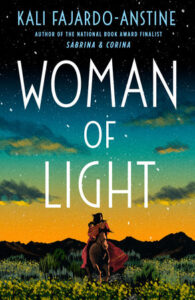
Kali Fajardo-Anstine, Woman of Light
One World, June 7
From the author of the celebrated story collection Sabrina & Corina comes a new tale of an Indigenous Chicano family, told across generations. At its heart is Luz, a tea leaf reader, whose brother is attacked by a violent white mob. Our heroine is alone in the world—until she starts having visions of her ancestors. Woman of Light is an entrancing book about the stories we carry, the ones we need to keep telling. What family secrets lay in her bloodline? What great love? National Book Award finalist Kali Fajardo-Anstine has given us another stunning cast of characters to root for. –KY
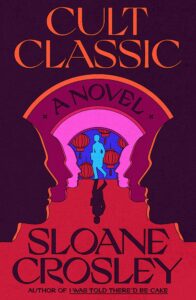
Sloane Crosley, Cult Classic
MCD, June 7
I’ve long been a fan of Crosley’s wry, irreverent personal essays and cultural commentary, so I’m very much looking forward to reading her latest novel, which is billed as a “surrealist meditation on love in an age when the past is ever at your fingertips and sanity is for sale.” Yep, very good, sign me up. –ET
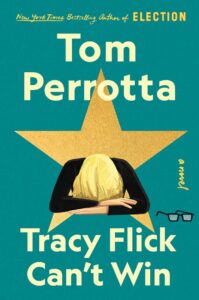
Tom Perrotta, Tracy Flick Can’t Win
Scribner, June 7
After a 23-year hiatus, Tom Perrotta’s most iconic character (with apologies to Kevin Garvey) is back. Tracy Flick—the high-strung, uber-ambitious, obnoxiously self-confident high school student who urged her classmates to “Pick Flick” for student body president—is now a middle-aged and under-appreciated New Jersey assistant principal with her eye on the top job, worried that the school district Superintendent is plotting against her. Expect another whip-smart, darkly comic skewering of American suburbia from one of the masters of the genre. Here’s hoping Reese Witherspoon is already in talks for the adaptation. –DS
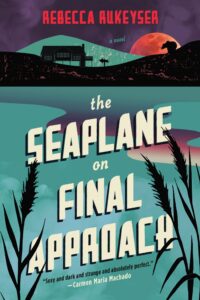
Rebecca Rukeyeser, The Seaplane on Final Approach
Doubleday, June 7
At a remote wilderness lodge in the Kodiak Archipelago, Mira is a seasonal worker in pursuit of sleaze. It sounds like a horny bottle episode of a novel that’s also a workplace comedy at the edge of the world. According to Tony Tulathimutte, “It’s like if Muriel Spark got seasick and dropped molly instead of dramamine.” I’m extremely into it. –JG

Keith Gessen, Raising Raffi
Viking, June 7
An honest account of the first five years of fatherhood from novelist and translator Keith Gessen, a founding editor of n+1 and the husband of novelist Emily Gould. For a taste, read his 2019 essay about discipline, love, and rage, here. –ET

Joseph Osmundson, Virology: Essays for the Living, the Dead, and the Small Things in Between
W.W. Norton, June 7
The last two years have made amateur virologists of us all. And though the idea of virality as the central metaphor for contemporary digital life has lost some of its sheen (in the face of so much IRL virality) it nonetheless retains much of its power. Luckily, we have Joseph Osmundson—an actual virologist—who writes with elegance and insight about the intersection of the real and the metaphorical, moving through topics like the legacy of HIV/AIDS, the long-term impact of Covid variants, and the effects of a prolonged pandemic on our systems of power. This is very much a book of our times. –JD
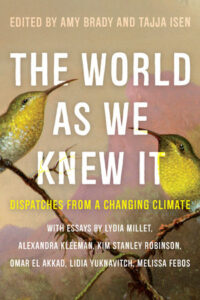
Amy Brady and Tajja Isen, eds., The World As We Knew It
Catapult, June 14
Amy Brady, executive director of Orion, and Tajja Issen, editor-in-chief of Catapult, have both long supported writers that tell the story of the climate crisis in unconventional, engaging ways. Now, the two have joined forces to edit The World As We Knew It, an anthology that draws in voices from across the fields of literature and environmental writing to show what a global catastrophe looks like on an individual level. With contributions from Alexandra Kleeman, Kim Stanley Robinson, Omar El Akkad, Melissa Febos, and many others, this book offers input from some of our most inventive and exciting contemporary essayists on our rapidly changing world. –CS
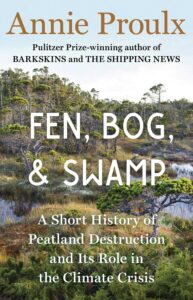
Annie Proulx, Fen, Bog, & Swamp
Scribner, June 14
Anybody who knows me knows I love bogs, so you better believe I’d be reading this one even if it wasn’t written by the Pulitzer Prize-winner author of The Shipping News, Barkskins, and “Brokeback Mountain.” Lifelong environmentalist Proulx’s history of our wetlands (from the fens of 16th-century England to the modern-day plight of the Amazon rainforest), their ecological role, and what their systematic destruction means for the planet looks to be both a fascinating natural history and a vital call-to-arms by one of the country’s greatest living writers. –DS
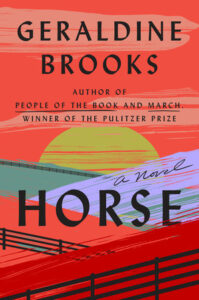
Geraldine Brooks, Horse: A Novel
Viking, June 14
Geraldine Brooks—author of March, which won a Pulitzer Prize, along with Caleb’s Crossing, People of the Book, and Year of Wonders—is back with a novel with its roots in the story of Lexington, a leading racehorse in the mid-19th century. The story reaches from 1850s Kentucky to a century later in New York City and, eventually, present-day Washington, DC, showing the echoes of history across a multitude of lives. –CS
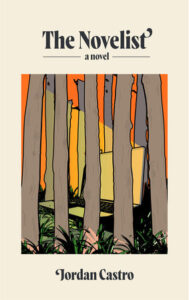
Jordan Castro, The Novelist
Soft Skull, June 14
Jordan Castro is the previous editor of New York Tyrant Magazine, which published barbed, efficient, emotional writing that lacked the didacticism and slow pacing of other outlets. I expect similar from Castro’s debut novel, which the titular novelist over a single morning as he struggles to write an autobiographical novel based on his own heroin addiction and recovery. I care about novelists, so I’m excited. –WC
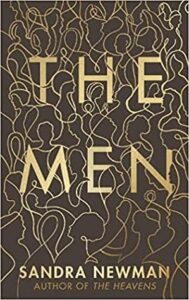
Sandra Newman, The Men
Grove Press, June 14
In 2019, I tried to get everyone I knew to read Newman’s The Heavens, a subtle and provoking time travel novel that pulled off a remarkable trick I won’t elaborate on here. Her latest book also promises to delight me, considering that the premise is that all men on earth have spontaneously disappeared—or at least been relocated. I’d follow Newman anywhere, and I’ll definitely follow her here—can’t wait. –ET
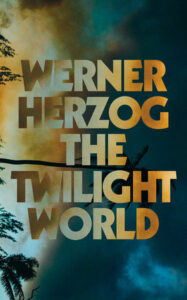
Werner Herzog, The Twilight World
Penguin, June 14
Yes, you read that right; the most intriguing and sibylline filmmaker of the last fifty years is publishing a novel, and it sounds extremely on brand. The Twilight World tells the story of Hiroo Onoda, a real-life Japanese solider who “defended” a small island in the Philippines for twenty-nine years after the end of World War II. Herzog, of course, met and befriended Onoda in Tokyo back in the 90s, teasing out the tale of soldier’s long war, a tale which the German auteur has now immortalized in a modern-day Robinson Crusoe story, described by its publisher as a “glowing, dancing meditation on the purpose and meaning we give our lives.” –DS
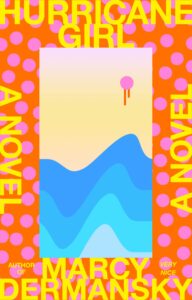
Marcy Dermansky, Hurricane Girl
Knopf, June 14
Marcy Dermansky’s last book, Very Nice, was “wickedly fun and emotionally potent,” and with its gonzo stakes Hurricane Girl promises a similar tonal mixture. Allison has just run away from her movie producer boyfriend and built a modest life for herself, but then a hurricane ruins it all, and her set of guiding questions radically transforms: “Should she go home from the bar with the strange cameraman and stay in his guest room?” reads Knopf’s description. “Is that a glass vase he smashed on her skull? Can she wipe the blood from her eyes, get in her car, and drive to her mother’s? Does she really love the brain surgeon who saved her, or is she just using him for his swimming pool?” I’m already invested. –WC

Bolu Babalola, Honey and Spice: A Novel
William Morrow, June 21
Bolu Babalola’s debut novel centers on college student Kiki Banjo, a relationship expert who hosts Brown Sugar, Whitewell University’s student radio show. Kiki meets her match in resident playboy Malakai Korede, who she dubs “The Wastemen of Whitewell.” Like any good rom-com, the book features fake relationships, missed communication, and enough romantic tension to cut with a steak knife. In January of this year, Babalola tweeted her excitement about the forthcoming novel: “This has been technically four years coming, but really it’s been my whole life. Four years, three versions, a masters degree and another book in between.” –VW
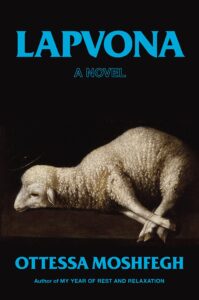
Ottessa Moshfegh, Lapvona
Penguin, June 21
I loved My Year of Rest and Relaxation. I even loved that bit at the end that seemed to piss a lot of people off (I thought it was cool and I will not recant or apologize). Anyway, Moshfegh’s new novel sounds like a pretty significant departure for the author. Set in a medieval fiefdom beset by natural disasters, Lapvona is the story of a motherless shepherd boy, his bond with a mysterious and mystical village midwife, and his run-in with the family of an evil local lord. I’m imagining Buried Giant with more bodily fluids. –DS
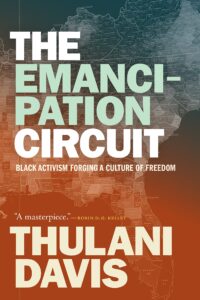
Thulani Davis, The Emancipation Circuit: Black Activism Forging a Culture of Freedom
Duke University Press, June 24
In a distinguished career spanning decades, Thulani Davis has expanded our understanding of freedom and justice with novels, poetry, plays, screenwriting, and scholarship. The Emancipation Circuit is her study of the ways that millions of formerly enslaved people changed America during Reconstruction as they formed new communities, political alliances, educational strategies, and networks of aid—a sweeping, fascinating history, about which I’m looking forward to learning more. –CS

Jess Walter, The Angel of Rome: And Other Stories
Harper, June 28
Jess Walter’s new collection of stories gives us characters as diverse as an actor in recovery, an exchange student in Rome, a teenage girl grappling with the loss of her mother, and a young gay man struggling to connect with his elderly father. Walter is sure to bring his poignant touch to these stories as he did with his previous books, Beautiful Ruins and The Cold Millions. –CS
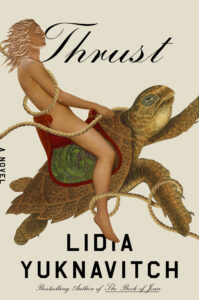
Lidia Yuknavitch, Thrust
Riverhead, June 28
I’ll read anything by Lidia Yuknavitch (and anything sandwiched in that glorious cover). Thrust tells the story of a motherless girl growing up amid the chaos of climate change and a growing police state who, after learning that she has the power to travel through time, harnesses that skill to rescue folks in the past. You know what they say about great power and responsibility… –ES
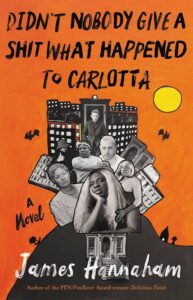
James Hannaham, Didn’t Nobody Give a Shit What Happened to Carlotta
Little, Brown, June 28
From the author of PEN/Faulkner Award winner Delicious Foods, a novel about a trans woman’s re-emergence into the world after spending 20 years in a men’s prison—the action centered on one Fourth of July weekend. Also obviously an early contender for the best title of the year. –ET
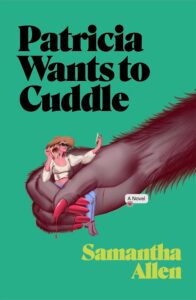
Samantha Allen, Patricia Wants to Cuddle
Zando, June 28
Samantha Allen (Real Queer America) wrote for Lit Hub recently about the direct line between slasher films and elimination-style reality TV, and she brings those genres together in her debut novel, Patricia Wants to Cuddle. On a creepy island in the Pacific Northwest, four “Final Girls” competing for love on The Catch discover the stakes are infinitely higher than expected. –ES
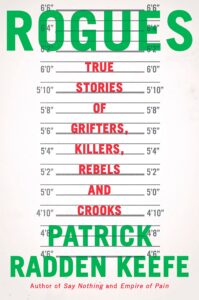
Patrick Radden Keefe, Rogues: True Stories of Grifters, Killers, Rebels and Crooks
Doubleday, June 28
This volume collects a dozen New Yorker articles by staff writer Keefe, who is also the celebrated author of Say Nothing and the recent Empire of Pain, which, he writes in the preface, cover “some of my abiding preoccupations: crime and corruption, secrets and lies, the permeable membrane separating licit and illicit worlds, the bonds of family, the power of denial.” –ET












